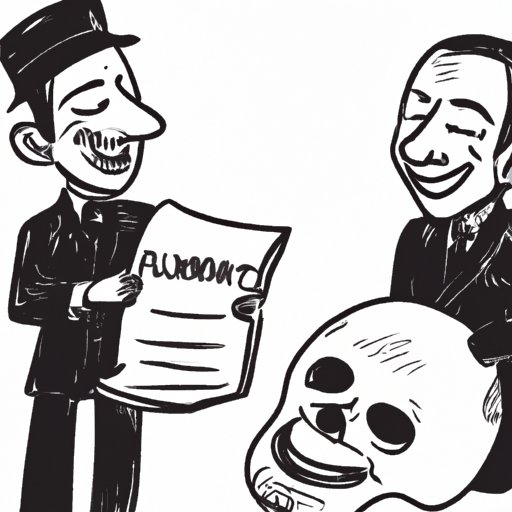I. Introduction
Death is a crucial part of life, and it is often a challenging period for families and friends of the deceased. During this time, many questions and concerns may come up regarding funeral preparations and post-death arrangements. Morticians play a crucial role in helping families through this difficult period. The primary purpose of this article is to inform readers about the role morticians play in society. This article will aim to dispel myths and misconceptions that surround the profession while also providing insight into the emotional requirements of the job. This article is intended for anyone interested in understanding more about this profession or those seeking information about funeral preparations.
II. Understanding the Role of a Mortician in Society
Who is a mortician and what do they do? Morticians are professionals entrusted with the responsibility of preparing and care-taking of the deceased. They ensure the proper handling of bodies and work closely with families in funeral planning.
Morticians are essential, as they provide support and guidance during one of the most challenging times in someone’s life. Many families are not aware of the proper rituals and procedures after a loved one’s death, and morticians help families navigate the funeral arrangements. They also provide support in choosing the burial or cremation options, casket and vault selection, and any other post-death arrangements.
III. The Art of Embalming
When someone dies, the body undergoes various changes and will ultimately decompose if not appropriately handled. Embalming is the process of chemically treating the body to delay the potential onset of decay, making the deceased look as peaceful and natural as possible during the funeral. This process also disinfects the body and preserves it for transportation and viewing.
Morticians undergo extensive training in understanding the science behind embalming. They know how to prepare the body, use chemicals, and handle the process respectfully and with dignity while ensuring that the final presentation is of an extremely high standard. Morticians emphasize attention to detail as it is through their work that the deceased’s family and friends should be able to say a proper farewell to their loved one.
IV. Unveiling the Myths and Misconceptions Surrounding Morticians and their Profession
Morticians have been the center of many myths and misconceptions concerning their profession. One of the most significant misconceptions is that morticians are only concerned with money and do not genuinely care about the families they work with. This idea is far from the truth. Morticians take their roles very seriously and are dedicated to ensuring that the families they work with are supported and cared for throughout the process.
Another myth surrounding morticians is that they only work with dead bodies. While it is true that preparing the body is a significant aspect of the job, morticians work with the living as well. They often provide grief counseling and emotional support for families struggling to come to terms with the death of their loved ones.
V. The Emotional Demands of a Mortician
Caring for those who are grieving is one of the most challenging aspects of the mortician’s job. It is impossible to encounter death on a daily basis without it taking a toll on the professional. The emotional weight can be overwhelming, and in some cases, as resulting in mental health issues such as depression and anxiety.
In an interview with a funeral director, they discuss some of the emotional challenges they face. They note that understanding the importance of grief is crucial in helping grieving families. There is no “one size fits all” formula for supporting someone through grief, and morticians must have the ability to be present, patient, and empathetic. Coping mechanisms, such as support from friends and colleagues, are essential to prevent burnout from the emotional demands of the job.
VI. The Legal Requirements for Becoming a Licensed Mortician
Becoming a licensed mortician demands specific qualifications and licensure requirements. Candidates must have completed a bachelor’s or associate’s degree in mortuary science from an accredited program, which includes theoretical and practical coursework, such as embalming and funeral service law. In some states, applicants must also take and pass a state examination.
Licensing requirements vary between states, although most states require candidates to have completed at least 2 years of apprenticeship with a licensed and practicing mortician. Applicants must also submit paperwork such as a background check, fingerprint cards, and proof of completion of certification courses in areas such as infection control and hazardous materials. Regulations help to assure the public that their loved ones are in the care of professionals who have the appropriate qualifications to perform various tasks.
VII. Behind the Scenes: An Inside Look at a Day in the Life of a Mortician
Morticians have a crucial role to play in funeral preparation. Beyond preparing the body, they often work long hours, are tasked with organizing transportation, liaising with clergy members, preparing and submitting death certificates, and more.
A typical day in a mortuary may include embalming, helping families to choose caskets and vaults, transporting the body, organizing the funeral ceremony, and meeting with subcontractors and vendors. Even though the mortician’s job is emotionally demanding, there are still moments of joy and humor. For instance, helping families achieve their wishes and knowing that their loved ones are in good hands can bring a sense of fulfillment.
VIII. Conclusion
In conclusion, morticians play an essential role in society, providing an essential and necessary service. They are an integral part of funeral procedures, from embalming to providing emotional support to the families of the deceased. Misconceptions that surround their profession must be challenged, and understanding the emotional demands of the job is crucial in ensuring that these professionals are adequately supported and are in the best position to serve grieving families.
Overall, the mortician professional must navigate a combination of legal requirements, ethical challenges, and emotional demands. By properly supporting morticians and providing the right environment for them to thrive, many families can benefit from their work and professional services.
